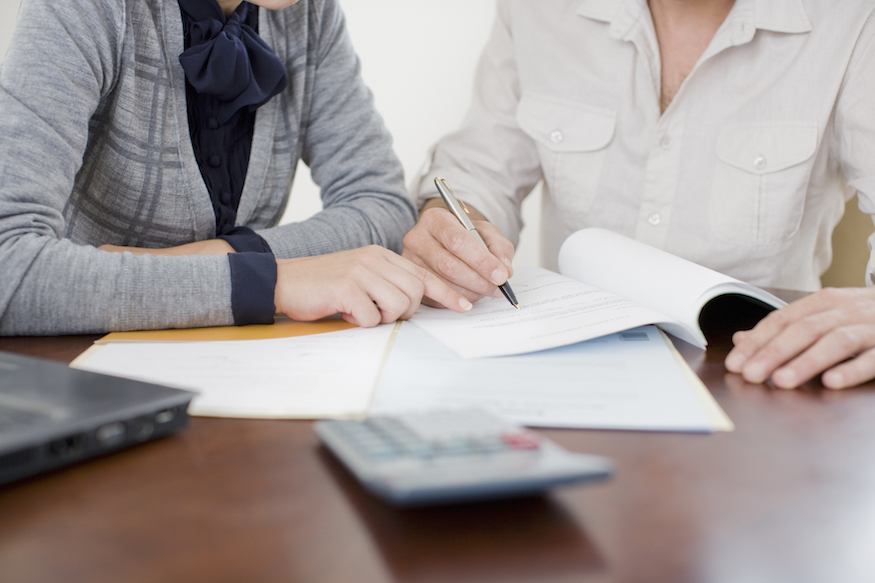So, you want to buy a home, but you don’t know where to start. Don’t worry: we’ve got you covered. Here’s a no-nonsense guide on how to buy a home for the first time, step by step.

Save for a Down Payment
Before you can even consider buying a home, you’ll have to save some money for a down payment. The minimum down payment in Canada for properties under $500K is 5 per cent. If you’re buying a pricier house, you’ll be required to put down 5 per cent on the first $500K and 10 per cent on the remainder. If you put down less than 20 per cent, you’ll be required to purchase mortgage default insurance, which is between 2.8 and 4 per cent of the purchase price.

Get Pre-Approved
Make an appointment to get pre-approved for a mortgage. The amount of home you can afford will be based on your down payment, your annual salary and your credit score. (What is a good credit score, you ask? Anything above 700 is good, above 800 is excellent). Tips for first-time homebuyers who are self-employed: because your income may fluctuate, you’ll be required to turn over your tax returns from the past two years. Remember to shop around for mortgage rates.
Related: 15 Money-Saving Tips for First-Time Homebuyers From Scott McGillivray

Do Some Research
It’s always best to do a little bit of research before you dive headfirst into looking for homes. Now that you know how much you can afford, you’ll want to see what neighbourhoods and what size of home works with your budget. With a $500K budget in Canada, you’ll might be able to afford a one-bedroom condo in Toronto or Vancouver, but a four-bedroom house in the suburbs or a more affordable city like Montreal. Websites like Realtor and HouseSigma are most helpful.

Hire a Real Estate Agent
There are more than 100,000 real estate agents in Canada, so hiring the best one for you may seem overwhelming. Recommendations from family and friends goes a long way here. Also, be sure to hire someone who specializes in the area you’re looking in. If you want to buy a downtown condo, you don’t want to hire your sister’s realtor who helped buy her home in the suburbs two hours away. Going to open houses in the area you’re looking is a good way to meet realtors too.
Related: 7 Questions You Need to Ask Your Real Estate Agent Before Buying

Go Shopping
Although everyone says this is the “fun part,” it can also be exhausting and stressful. If you’re buying a home by yourself, have a person on speed dial to help talk you through any pros and cons. Also, try not to get too emotionally invested in any particular house, especially if you live in a large city that is prone to bidding wars (it’s one of the mistakes first-time homebuyers often make, according to Scott McGillivray). When you’re shopping around, remember to think about repair costs. If a home you love needs some renovations, you have to factor this into the overall price.

Make an Offer
If you make an offer and it is accepted: congratulations! But your homebuying journey doesn’t end there. Most offers have conditions in them before the deal is done. One is a home inspection (that’ll cost you $200-$400, your realtor likely has someone they recommend). There’s also financing (if you’ve been pre-approved, then you don’t have to worry about this; but your lender will still want to send an appraiser to ensure it’s actually worth how much they’re loaning you).
Related: Mike Holmes Reveals 10 First-Time Homebuyer Tips Everyone Should Know

Budget for Closing Costs
Don’t forget that you’ll need to budget for closing costs, specifically lawyers’ fees (that’ll cost you around $1-2K) and land transfer tax and (in all provinces other than AB and SK). Land transfer tax is calculated based on the property value. Homebuyers in Toronto incur an additional municipal tax. However, there are benefits for first-time homebuyers such as the land transfer tax refund, first-time homebuyer incentive, homebuyer’s plan and first-time homebuyer’s tax credit.
Related: This is the Income Required to Own a Home in Canada’s 13 Hottest Real Estate Markets

Remember the Details
Before you move into your new home, you’ll need to remember to hire a mover, purchase home insurance, change your mailing address and update the contact information for all your incoming bills (such as the hydro company and property management company if you’ve bought a condo with strata fees). Your lawyer will handle updating the info for your property taxes. You may want to sign up for Internet and cable, too. So you can watch HGTV Canada in your new home. 😉
Related: Condos vs. Houses: Which Should You Buy? Scott McGillivray Weighs the Pros and Cons
HGTV your inbox.
By clicking "SIGN UP” you agree to receive emails from HGTV and accept Corus' Terms of Use and Corus' Privacy Policy.




